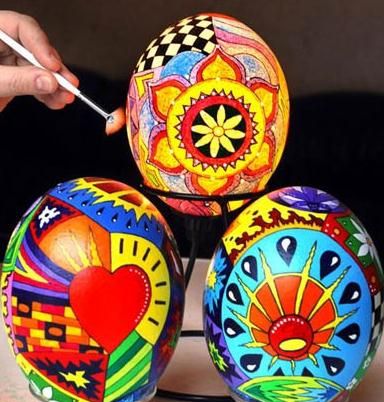复活节 Easter Day(英文介绍)
爱思英语编者按:复活节(主复活日)是一个西方的重要节日,在每年春分月圆之后第一个星期日。基督徒认为,复活节象征着重生与希望,为纪念耶稣基督于公元30到33年之间被钉死在十字架之后第三天复活的日子。
A Sunday between March 22 and April 25
The meaning of many different customs observed during Easter Sunday have been buried with time. Their origins lie in pre-Christian religions and Christianity. All in some way or another are a "salute to spring," marking re-birth. The white Easter lily has come to capture the glory of the holiday. The word "Easter" is named after Eastre, the Anglo-Saxon goddess of spring. A festival was held in her honor every year at the vernal equinox (春分).
People celebrate the holiday according to their beliefs and their religious denominations (命名). Christians commemorate Good Friday as the day that Jesus Christ died and Easter Sunday as the day that He was resurrected (复活). Protestant settlers brought the custom of a sunrise service, a religious gathering at dawn, to the United States.
This year Easter will be celebrated on Sunday April 11, 2004. On Easter Sunday children wake up to find that the Easter Bunny has left them baskets of candy. He has also hidden the eggs that they decorated earlier that week. Children hunt for the eggs all around the house. Neighborhoods and organizations hold Easter egg hunts, and the child who finds the most eggs wins a prize.
The Easter Bunny is a rabbit-spirit. Long ago, he was called the" Easter Hare." Hares and rabbits have frequent multiple births so they became a symbol of fertility. The custom of an Easter egg hunt began because children believed that hares laid eggs in the grass. The Romans believed that "All life comes from an egg." Christians consider eggs to be "the seed of life" and so they are symbolic of the resurrection of Jesus Christ.
Why we dye, or color, and decorate eggs is not certain. In ancient Egypt, Greece, Rome and Persia eggs were dyed for spring festivals. In medieval Europe, beautifully decorated eggs were given as gifts.

Egg Rolling
In England, Germany and some other countries, children rolled eggs down hills on Easter morning, a game which has been connected to the rolling away of the rock from Jesus Christ's tomb when he was resurrected. British settlers brought this custom to the New World.
In the United States in the early nineteenth century, Dolly Madison, the wife of the fourth American President, organized an egg roll in Washington, D.C. She had been told that Egyptian children used to roll eggs against the pyramids so she invited the children of Washington to roll hard-boiled eggs down the hilly lawn of the new Capitol building! The custom continued, except for the years during the Civil War. In 1880, the First Lady invited children to the White House for the Egg Roll because officials had complained that they were ruining the Capitol lawn. It has been held there ever since then, only canceled during times of war. The event has grown, and today Easter Monday is the only day of the year when tourists are allowed to wander over the White House lawn. The wife of the President sponsors it for the children of the entire country. The egg rolling event is open to children twelve years old and under. Adults are allowed only when accompanied by children!
Traditionally, many celebrants (司仪神父) bought new clothes for Easter which they wore to church. After church services, everyone went for a walk around the town. This led to the American custom of Easter parades all over the country. Perhaps the most famous is along Fifth Avenue in New York City.
Good Friday is a federal holiday in 16 states and many schools and businesses throughout the U.S. are closed on this Friday.